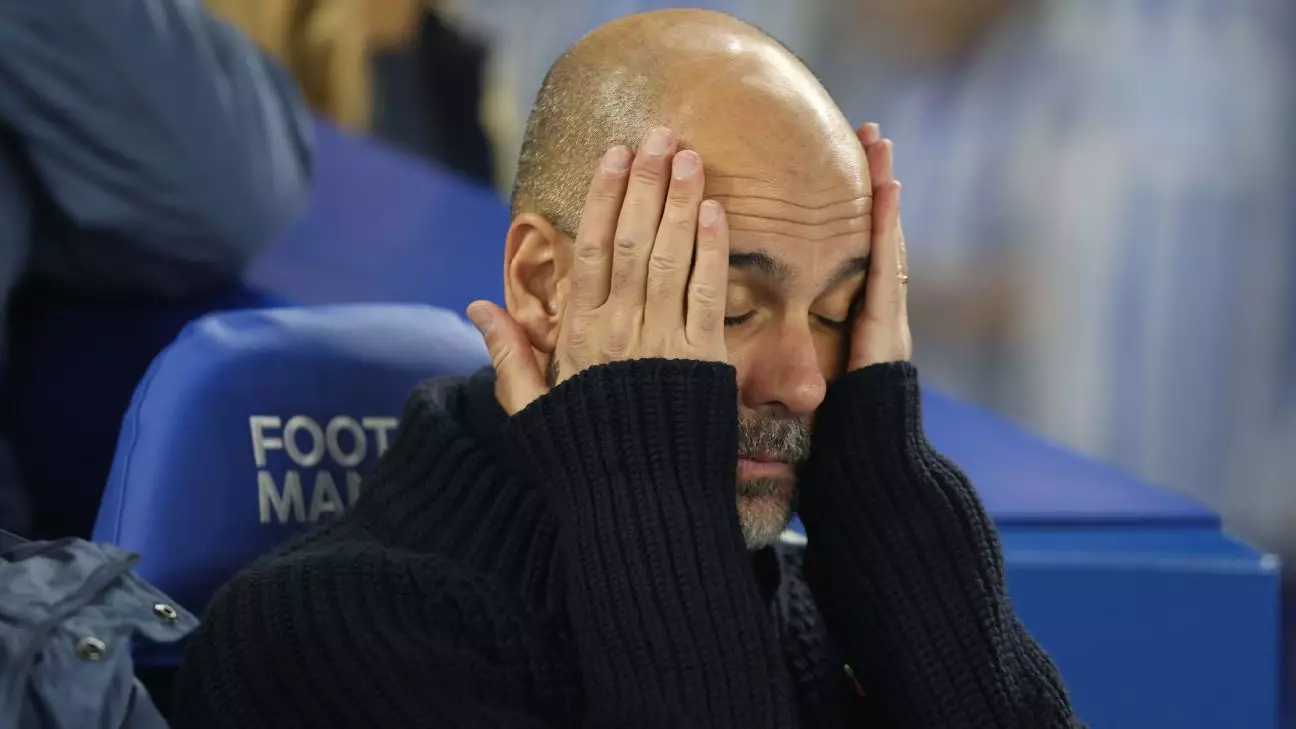The narrative surrounding Pep Guardiola and Manchester City is seeing its most intricate plot twist yet. For a manager who has defined the modern game with transformative leadership across several clubs, the current situation presents a stark departure from the glory days. The defining moment arrived with a surprising 2-1 loss to Brighton, marking Guardiola’s fourth consecutive defeat—an unprecedented streak in a managerial career that began in 2008 with Barcelona. Such a string of poor performances recalls the stark realities of competitive sports, where even the mightiest can falter, leading to speculation about an era’s end.
While each loss can be viewed in isolation, the cumulative impact on Manchester City is significant. This downfall is not an isolated event but rather a collection of issues converging into a full-blown crisis. With heavy defeats at the hands of Tottenham, Bournemouth, and Sporting CP, it seems that every competitive arena now poses a threat to City’s once-untouchable status. The fear that a legendary team may be witnessing the twilight of their exceptional run is palpable among fans and pundits alike. Guardiola himself acknowledges the atmosphere surrounding this worrying trend, commenting on how the perception of inevitable decline has followed successful clubs throughout football history.
The timing of these losses couldn’t be more precarious; they are compounded by external pressures that loom heavily over the club. Notably, the ongoing scrutiny and uncertainties surrounding 115 charges alleging financial irregularities hang like a dark cloud over the Etihad Stadium. The ramifications of such controversies extend beyond immediate performance, potentially deterring new talent from choosing City as a destination, given the looming threats of sanctions or even expulsion from top-flight football.
Another blow to Guardiola’s plans is the impending exit of Txiki Begiristain, the director of football who has been by his side for the entirety of his tenure. This shift raises inevitable questions about the future direction of the club and whether Guardiola remains committed beyond his current contract, which expires next June. The instability felt within management is mirrored by the turbulence on the pitch, as injury woes plague key players including Kevin De Bruyne and Ruben Dias. These injuries compound the tactical challenges Guardiola faces while trying to regain consistency.
Critically, the loss of star midfielder Rodri has been spotlighted as a significant factor in the team’s dip in form. Given Rodri’s strong performance metrics—Boasting a win rate of 73.6% when he’s on the pitch—his absence cannot be overlooked as a reason for the team’s struggles. While there have been glimpses of resilience in the immediate games following his injury, the overarching pressure to space out his absence with limited squad depth could become detrimental in the long haul.
Guardiola’s challenges are further compounded by the advanced age profile of several key players. The likes of De Bruyne, Kyle Walker, and Ilkay Gündogan are in their 30s, raising alarm bells about future squad sustainability. Such parallels draw comparisons to previous clubs in decline, notably Manchester United following Sir Alex Ferguson’s departure. The failure to secure adequate replacements has consistently hindered teams, as seen in United’s post-Ferguson era.
With a squad featuring fresh talents like Rico Lewis and potential future stars, relying on a foundation built on several aging pillars poses an obvious risk. The delicate balance of integrating youthful exuberance with experienced leadership is critical, but it remains unfulfilled in the face of current performance pressures.
In the eye of this storm, Guardiola remains optimistic, maintaining that the return of key players could restore the team’s fortunes. He emphasizes that the potential for success is still alive, with Manchester City only trailing five points behind the current league leaders. A significant upcoming match against Liverpool could serve as a pivotal moment in the season.
Despite the mounting challenges, the structural integrity of Manchester City’s talent and the managerial acumen of Guardiola should not be readily dismissed. The road to recovery may be fraught with hurdles, but within disarray lies potential for resurgence—a narrative that Guardiola knows all too well in his storied career.
While the present scenario feels tempestuous, it is essential to view performance dips through a broader lens. Again and again, history has shown that even the heaviest hitters can recover and redefine themselves. Guardiola’s resilience and tactical brilliance will be put to the ultimate test in the coming months as the team navigates the complexities of a new, unpredictable era.

Leave a Reply